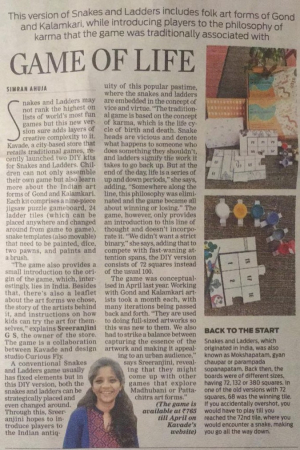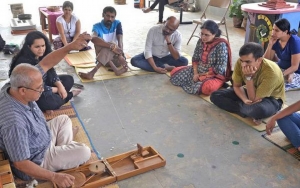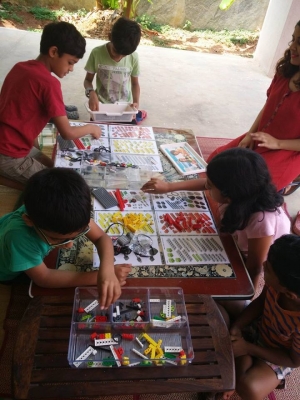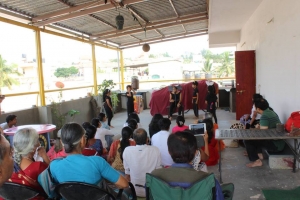Kavade ToyHive

Draughts, also known as Checkers in North America, is a game derived from an ancient Egyptian game called Alquerque. The game was created in Europe using the chess board and has several variants.
Game Type: Strategy
No. of Players: 2
Play Pieces:12 PAWNS FOR EACH PLAYER + Extra pawns for Kings
Chowkabara is a popular race game played using cowrie shells. In the early days pottery shards, tamarind seeds, nuts, pulses and stones were used as playing material.
Game Type: Race
No. of Players: 2-4
Play Pieces:4 PAWNS FOR EACH PLAYER, 4 COWRIE SHELLS (6 for 7x7 Chowkabara)
Bagh bakri or Tiger goat game or Aadupuliaatam belongs to the family of hunt games involving prey and predator, with the prey being much larger in number than the predator. These games are found carved into stone slabs in historic monuments and temples across India. One of the variants of this game is known as Bagh Chal, which is also the national game of Nepal. In Europe, this game is known as Fox and Geese.
Game Type: Strategy
No. of Players: 2
Play Pieces: 24 goats & 2 tigers
From cards that call out social prejudice to Snakes and Ladders with karmic philosophy, these India-centric board games made their debut during the pandemic
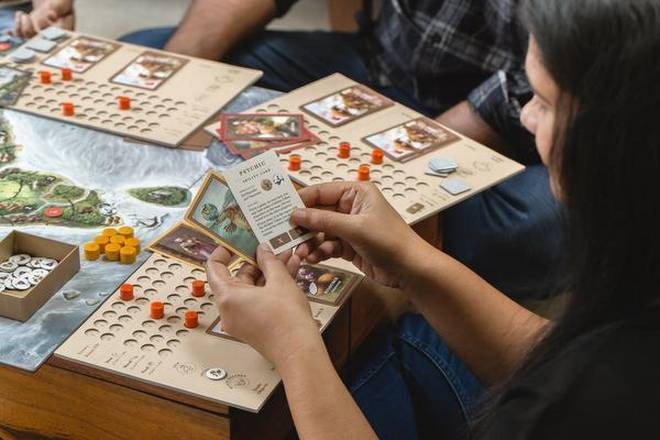
Roll the dice, step back in time (Bharata 600 BC)
Caprisoned elephants, turbanned rajahs, shining swords, a quiver full of arrows, messenger pigeons and the glorious promise of war — you don’t need a magic carpet to travel back in time. Bharata 600 BC, a board game, will take you back to ancient India where many a kingdom’s fate was sealed by behind-the-scenes puppet masters.
Conceptualised by Cristina Maiorescu, ideated by Pallavi Nopany and illustrated by Ishan Trivedi, Bharata 600 BC takes players through a time in India where territories were enlarged via alliances, trade or battle. Played on a board that depicts the map of India in 600 BC, it shows the country at the end of the Vedic period, when 16 independent kingdoms were in power. Each player is assigned a kingdom and has to expand territory as the game progresses. Players choose their leadership persona and are then granted abilities to complement their personality.
This version of Snakes and Ladders includes folk art forms of Gond and Kalamkari, while introducing players to the philosophy of karma that the game was traditionally associated with
BENGALURU: Snakes and Ladders may not rank the highest on lists of world’s most fun games but this new version sure adds layers of creative complexity to it. Kavade, a city-based store that retails traditional games, recently launched two DIY kits for Snakes and Ladders. Children can not only assemble their own game but also learn more about the Indian art forms of Gond and Kalamkari. Each kit comprises a nine-piece jigsaw puzzle gameboard, 24 ladder tiles (which can be placed anywhere and changed around from game to game), snake templates (also movable) that need to be painted, dice, two pawns, and paints and
a brush.
Cultures & traditions are living ecosystems. There is much to be learnt through respect & observation of indigenous cultures & traditions. In the last few centuries, we have been witnessing the growing hazard of homogenization of cultures- similar livelihoods, identical constructions, eating habits, healthcare, consumer goods, and entertainment. As Helena Norberg Hodge aptly says “Diverse cultures from Alaska to Australia have been overrun by the industrial monoculture. The spread of industrial monoculture is a tragedy of many dimensions. With the destruction of each culture, we are erasing centuries of accumulated knowledge, and as diverse ethnic groups feel their identity threatened, conflict & social breakdown almost inevitable follow”. If culture were placed at the heart of development policies, we will assuredly be making way for an ecosystem-centered, humanitarian & inclusive development.
Tanjavur Kattam, also called Dhayakattam, is a race game from Tamil Nadu that bears resemblance to Pagade and the more well-known Ludo. Dhayam (Dice count 1) is needed to start any race game and in tamil, ‘dhayam’ means ‘relation’.
Game Type: Race
No. of Players: 2-4
Play Pieces: 4 Pawns/player, 2 Dice
The art of spinning is coming back, thanks to the efforts of people like Madhav Sahasrabudhe
There is an air of peace and calm as you walk on to the terrace of Kavade Attic on 1st Main in Sheshadripuram. The cosy ambience is set up with cane mats on the floor and lots of charkhas (spinning wheels). Madhav Sahasrabudhe, a mechanical engineer from Pune, catches your eye.
Dressed in a khadi kurta and trousers made from the yarn he spun, the man is engrossed in spinning. Madhav is in the city for the recently-concluded two-day spinning workshop, organised by Kavade Attic. As he spins, the spinner talks about the art and the calming effect it has on one’s mind.
This workshop was based on robotics using Lego Wedo construction kit tool where we designed our own interactive machines and then programmed it. This is the base for children in their lifelong learning. The next Lego Wedo is on 24 April at Kavade Attic. Hurry Up!
Theatre games & lots of fun, making props, a wonderful performance by the kids & pizza party too!. The next one is from 24th Apr-29th Theatre workshop at Lavender lane, Kothanur Anuradha Rao, Sandeep Jain, Untitled Arts Foundation.








